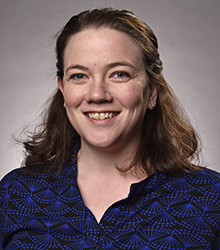We caught up with two recent NMCC alumna to see what exciting things they have been up to and how their experiences in this certificate helped them on their way!
 Emily McGinn received her PhD in Comparative Literature in 2014 and is currently the Digital Humanities Coordinator at the University of Georgia, overseeing the Willson Center Digital Humanities Lab (DigiLab), where she develops Digital Humanities curriculum, provides workshops and training to faculty and students, and consults on grants and project scoping. “It is an enormous job that keeps me moving,” Emily explains, where “I am perpetually learning new skills, testing new tools and applications, and finding creative solutions to complex projects.”
Emily McGinn received her PhD in Comparative Literature in 2014 and is currently the Digital Humanities Coordinator at the University of Georgia, overseeing the Willson Center Digital Humanities Lab (DigiLab), where she develops Digital Humanities curriculum, provides workshops and training to faculty and students, and consults on grants and project scoping. “It is an enormous job that keeps me moving,” Emily explains, where “I am perpetually learning new skills, testing new tools and applications, and finding creative solutions to complex projects.”
Taking a “non-traditional path,” Emily did not anticipate this career trajectory when beginning her PhD. She credits John Russell, now at Penn State, for setting her on this path after introducing her to the Digital Humanities.
“Through his guidance and the NMCC curriculum, I gained the skills and experience necessary to earn a CLIR (Council of Library and Information Resources) Postdoctoral Fellowship in Digital Humanities at Lafayette College in Pennsylvania. Working on the Digital Scholarship Services team at Lafayette furthered the work I had begun with NMCC and propelled me to my new position at UGA.”
Looking back on her time with the NMCC, she “knew that pursuing the certificate was worth the investment. The program expanded my vision for what was possible after grad school and encouraged me to apply broadly to a variety of opportunities.”
Emily’s current projects include integrating DH projects into traditional humanities classes, “working with professors to bring DH skills and methods directly into the undergraduate classroom while also building capacity among the faculty for future DH work.” Though a career in this field is often in constant flux, she enjoys research opportunities open to her and opportunities to “push the boundaries of scholarship” and is looking forward to what the future holds.
Emily’s resource recommendations:
The Programming Historian – peer-reviewed, beginner-friendly source for all things DH
dataviz – fun, sleek guide for tools, resources and technologies in data visualization
_____________________________________________
Chelsea Bullock also received her PhD in 2014, in Media Studies, and currently handles UX (user experience) research and strategy at IBM with The Weather Company, where her favorite part of the day is collaborating and “grappling with big, difficult questions like:
- How do we provide parity in technological access across the global spectrum of connectivity?
- How do technological habits and expectations vary around the world?
- How do we anticipate the ways technology is evolving the ways we interface with one another, with our environments, and with the changing climate?”
Chelsea credits her participation in the New Media and Culture Certificate for introducing her to “multi-faced approaches to technology…and it’s symbiotic relationship with culture,” providing “a solid foundation for thinking critically and historically about technology” and practice in asking questions and building compelling arguments – skills she now uses daily.
“As a practice,” she explains, “I sketch the borders of the big picture before diving into details; asking ‘how’ and ‘why’ serves me well at IBM and has presented a lot of opportunities.”
Expanding her vocabulary through the NMCC, in addition to work with the Fembot Collective, gave Chelsea the confidence to pursue a future in the tech world in order “to ask hard questions, advocate for all users, and strategically design meaningful solutions to real problems.”
For those eager to follow a similar path, Chelsea recommends seeking opportunities for active work in your desired field, “dedicating the labor to a project with an actual deliverable result will help you determine whether or not the work is what you want to continue to pursue.” She also acknowledges how her desire to continue learning was of immense value to her as a candidate on the professional market. “Read widely, listen to diverse podcasts, participate in free webinars, attend local industry meetups, and watch tutorials and lectures in adjacent technologies or fields than the one(s) in which you usually work.”
Her favorite thing about technology? “I love its interconnectivity and evolving algorithmic logic, but I most appreciate the sophisticated ways technology lets us think about what it means to be human. The digital humanities enable us to reflect on historical networks as ways of being and sharing, and subsequently anticipate (re-)emerging patterns and trends.”
Chelsea’s resource recommendations:
Jocelyn K. Glei – blog/newsletter on work, design, and managing a digital life
LitHub – trusted source for all things literary: news to novels, publishing houses to non-profits
Brain Pickings : “for all the things you didn’t know you needed to read to be a better human in the world”
